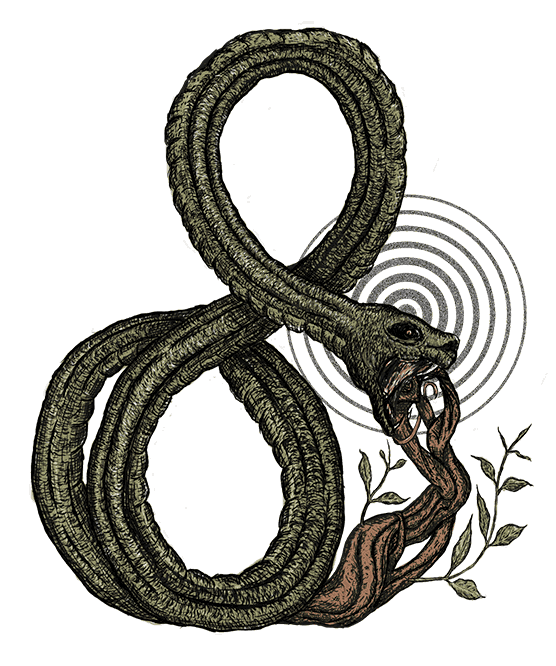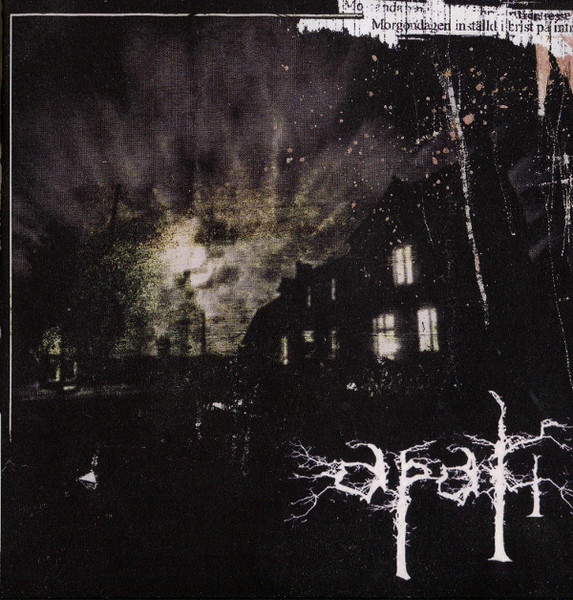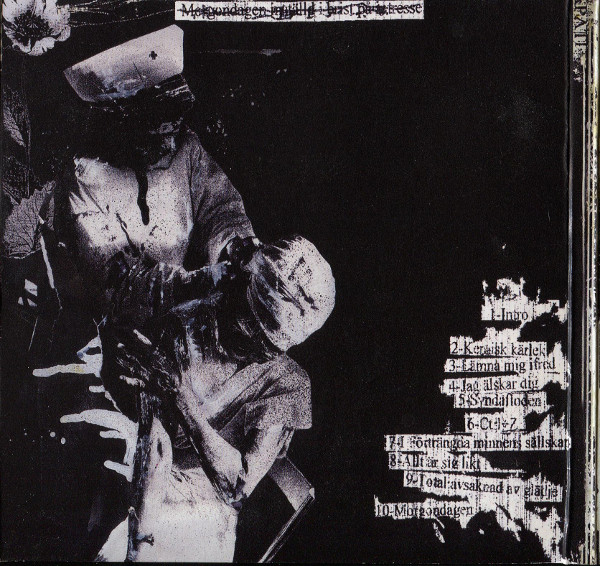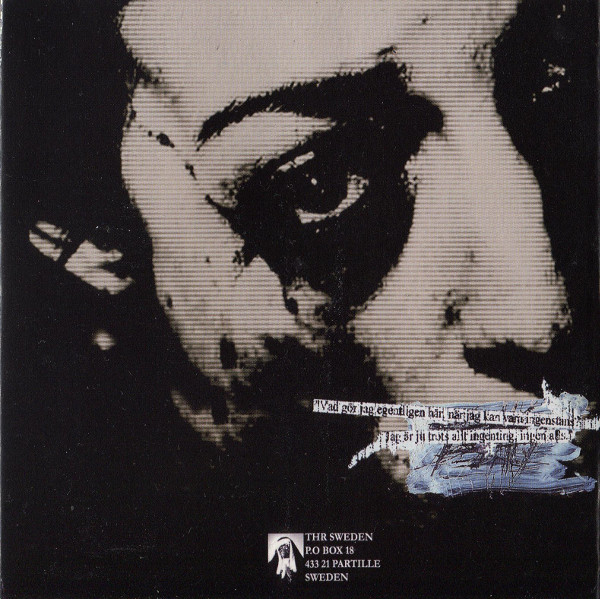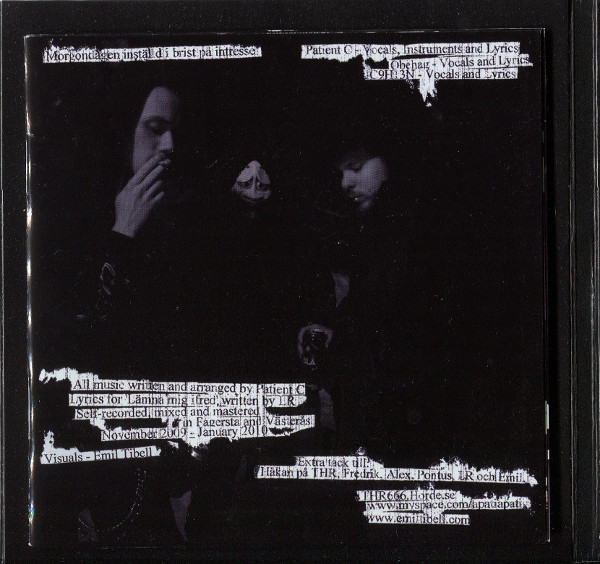Ofdrykkja: Pessimisten
2024-03-06
by Niklas Göransson
Emerging from the bowels of the Swedish black metal underground, Ofdrykkja has become a testament to resilience and rebirth. This is the story of Pessimisten, who left everything behind to seek redemption as a Nordic nomad.
PESSIMISTEN: As suggested by the title, “After the Storm” takes place as the sky begins clearing up. The heavy winds have settled, and through a crack in the dense clouds, light shines down on the ground upon which we stand. With that being said – and whilst hopeful sentiments are indeed integrated into this work – it’s definitely not a feel-good record.
OFDRYKKJA’s fourth album, “After the Storm”, was released by German label AOP Records in November 2022.
PESSIMISTEN: Lately, we’ve sensed the call to spread some light in this progressively darkening world. A few songs tell a more positively oriented story, such as the title track and “The Light”, while darkness still portrays itself within the likes of “The Mære” – whose lyrics are a folkloric take on the sleeplessness that still plagues me periodically – and “The Cleansing”, an apocalyptic story told through the framework of Norse mythology.
Besides musical developments, the previous album – “Gryningsvisor” from 2019 – saw a considerable shift in thematic content. Both aspects have been further evolved with “After the Storm”.
PESSIMISTEN: And so, while this work still offers a dive into the obscure waters of reality we’ve previously been associated with, I also wanted to share with our listeners a few potentially valuable ideas on harnessing the darkness and regaining control over their lives. This idea spawned the spoken-word lyrics of the album’s final track, “Beyond the Belt of Orion”.
How was the response to “Gryningsvisor”?
DRABBAD: It’s been surprisingly positive, far exceeding my expectations. When you’re immersed in an album for an extended period, it’s normal to become rather critical of it. The same tracks replayed endlessly for countless hours can make you overly familiar with every note. Over time, the only aspects that stand out are the errors and small details you wish you could refine. At some point, you must let it go – it’s virtually impossible to be fully satisfied. I’ll call it a day if I end up around seventy per cent.
Shortly after the release of “Gryningsvisor”, OFDRYKKJA’s original drummer, Bödeln – who left the band in 2016 – passed away. When the interview in Bardo Methodology #6 was conducted, details about the incident were still scarce.
PESSIMISTEN: From what I understand, Bödeln had a few beers and became disoriented, even talking to himself. Such behaviour wasn’t unusual for him after drinking. His girlfriend saw him exiting their flat and descending the stairs, then heard the crash of glass as he smashed the front door window. When he returned, she described hearing a noise similar to a kitchen tap running. It turned out he had severed an artery with the broken glass and, tragically, passed away before the ambulance arrived. Apparently, he’d been making progress up until his death and had overcome his drug abuse.
By all accounts, Bödeln had a tendency to lose touch with reality when sufficiently intoxicated. In the summer of 2010, he and Drabbad found themselves in a harrowing adventure that resulted in both men being first hospitalised and subsequently imprisoned. This incident became a bit of an underground legend after Drabbad recounted the events in a post on the Swedish counterculture forum Flashback. The episode was also extensively documented for English-speaking audiences in Bardo Methodology #6.
The following autumn, a year on from their misadventure, the Myspace page of Drabbad’s black metal project LEPRA received a message from a local band named APATI. Their guitarist, Obehag, sought assistance in acquiring prescription meds. Drabbad, still incarcerated, replied that he couldn’t help. Soon after, APATI’s lead singer – Pessimisten – announced that assistance was no longer required since Obehag had succumbed to an overdose.
Out of this morbid exchange grew a friendship which eventually led to the creation of OFDRYKKJA. The pair planned to meet in person after Drabbad’s release – and in the interim, Bödeln joined the project as a drummer. An old friend of Drabbad’s, The Associate, was invited to play guitar.
PESSIMISTEN: I met Drabbad for the first time in early 2012. He was on permitted leave and wanted to bring along his infamous brother-in-arms. As soon as they got off the bus, it was clear to me that both had ingested benzodiazepines to a level beyond lobotomy. They were so doped up that it took several days before anyone realised that Bödeln had left his laptop on the bus. So, in hindsight, bringing them into my home might not have been the cleverest idea.
At the time, a neighbour was using Pessimisten’s flat to distillate alcohol, which meant that he had an endless supply of strong moonshine.
PESSIMISTEN: We’d been drinking for a few hours when Drabbad nodded off. I went out to get something to eat and came back with a kebab for Bödeln. He started acting strange… talking to himself, crying, and flinging pieces of kebab all over my living room. I had a broken finger from a recent fight – but even with both hands at my disposal, I wouldn’t have wanted to take on a psychotic violence machine of his size.
Worthy of note here is that – according to the police report from his 2010 arrest – Bödeln was a tall and muscular 120-kilo savage who’d once been a promising MMA prospect.
DRABBAD: I remember Pessimisten waking me up. ‘Hey, could you talk to your friend?’ Bödeln sat there with a torn-up kebab in front of him, mumbling something incoherent about poison. We tried to reassure him that nothing had been poisoned, but he wasn’t convinced. Finally, I ate some of it – then we waited for thirty minutes to see if I’d die. I didn’t, so Bödeln settled down and ate what remained of his kebab.
PESSIMISTEN: I guess that did the trick because we kept drinking for several days. But Bödeln would often go crazy in similar ways when he got wasted enough. As you can imagine, it was no easy task handling him verbally during these episodes, but Drabbad was always good at it. Physically neutralising that man would’ve been a complete impossibility.
Why did he leave OFDRYKKJA?
PESSIMISTEN: We’d booked a studio for a few days in September 2016, to record “Irrfärd” and take some band photos. Bödeln didn’t turn up, so I had to call a friend to come down to the studio and fill in on the drums. We thought he’d stayed at home to drink, and we had a fight about it. That was the last time any of us spoke to him.
In our previous conversation, we touched briefly both on Pessimisten’s troubled past and his extraordinary journey towards metamorphosis. We will soon delve further into the latter. However, to grasp the full extent of this achievement, it’s essential to understand the depths from which he emerged.
Pessimisten was prescribed SSRI antidepressants at only nine years of age. By thirteen, he’d been misdiagnosed with ADHD and given methylphenidate, a stimulant much like amphetamine. It was around this time he discovered alcohol and black metal. Come 2007, at eighteen years of age, he was in pretty rough shape.
PESSIMISTEN: I’d often be downtown, hanging out with a friend. He was five years older and had been on the streets for as long as we’d known each other. His appearance made it clear he was homeless: filth, stench, and all. He was on the Subutex program – an opioid medication for heroin addicts who can’t quit, similar to Methadone. He and I spent our time either drinking or huffing butane from lighter refill cans. If we couldn’t scrape enough cash together, begging was our resort, spinning a story about being short for the bus fare home.
I’ve never tried butane gas – what is it like?
PESSIMISTEN: Its effect is similar to nitrous oxide, or laughing gas, but it’s deadly. I’d hear a rumbling in my ears, akin to a helicopter. My voice became really deep, and sometimes I’d get horrible headaches. I remember one day in particular: my friend had been beaten up for sleeping in a parking garage . He looked awful, with his broken nose and black eye. We were really hungry and so approached some teenagers and asked them for money.
Now, that must have been quite the sight.
PESSIMISTEN: Indeed – my friend with his dirty clothes and battered face, and then me, gripping a can of lighter gas, probably drooling. Even worse, one of them recognised me; he was friends with my younger sister. Any normal person would’ve taken a moment to reassess his life choices at that point, but not me. I kept insisting on how hungry we were until they gave us some change, which we used to buy a kebab.
Pessimisten’s long streak of unfortunate life choices continued well into the next year – until it culminated one summer day.
PESSIMISTEN: The last thing I remember is sitting in an abandoned factory complex with some friends. I was downing cans of Elk Brew: a 7.5% beer, probably the cheapest way to get drunk back then. I certainly wasn’t drinking them for the taste. After that, my memories are hazy. Apparently, I got so drunk and annoying that the others left me. I then found my homeless friend with the Subutex prescription and persuaded him to give me one of his pills. Later, I ran into some guys I knew and bought a few capsules of Phenazepam.
Phenazepam is an extremely potent and long-lasting benzodiazepine. Back then, the drug had not yet been classified as an illicit substance in Sweden, so it was still legally available online.
PESSIMISTEN: My friend had ordered about half a kilo, so I convinced him to sell me some. Normally, a tiny amount – like the size of a pinhead – would be enough to fuck you up for the entire day. But in my state, I would’ve needed even less, yet I took several capsules. I knew that mixing benzos with alcohol is deadly. Opioids with alcohol are deadly, and benzos with opioids are deadly. In fact, just the amount of alcohol I’d drank could be lethal to the average person. Even an idiot would’ve known the outcome of this cocktail.
Do you think it was a suicide attempt?
PESSIMISTEN: I doubt I was consciously trying to end my life, but I certainly didn’t care whether I lived or died. Soon after, I instigated a fight with a group of guys for no reason. But I was so fucked up that they didn’t even have to hit me back; every time I took a swing, I’d end up falling on my face. My friends left when I started provoking a security guard. I was eventually found unconscious and rushed to the hospital.
Later, the doctors said he’d been on the verge of slipping into a coma. Had Pessimisten arrived at the hospital only three minutes later, he would likely have died.
PESSIMISTEN: For the first few days after coming to, I was still so doped up that I couldn’t walk; I had to use a wheelchair to get around. A friend of mine was in the same hospital – he’d mixed benzos with alcohol and then, somehow, fallen off his seventh-floor balcony. Sadly, the guy who sold me the Phenazepam shot himself ten years on. And my friend with the Subutex prescription also died, choking on his vomit in a homeless shelter.
About a week after regaining consciousness, Pessimisten was able to hobble forward with crutches. Despite medical advice to the contrary, he chose to discharge himself and return home to the basement of his mother’s house.
PESSIMISTEN: When I arrived, I threatened both my mom and her husband with a knife before smashing up my room with a baseball bat. The police came, put me in handcuffs, and brought me to the station. After the arrest, I lived on the streets for several weeks. I’m not quite sure where I was or what I did for most of that period, but I do recall the crutches. In total, an entire month has vanished from my memory.
Extensive blackouts following a benzodiazepine overdose are usually caused by anterograde, which means that new memories aren’t formed properly. This is because benzos depress the central nervous system and interfere with the transfer of information from the brain’s short-term to long-term memory storage.
PESSIMISTEN: When I began regaining my senses, it was like awakening from a bad dream – only to discover myself in an even worse nightmare. Not only was I homeless, but I soon realised that many of my friends had started abusing Phenazepam. They would all proceed to ruin their lives over the subsequent months. Several of them are dead now.
Did you go back to Phenazepam over the overdose?
PESSIMISTEN: No, I never touched it again. As my reason returned, I could see how fast it destroyed so many people around me. Also, I’ve never liked benzodiazepines, so it was easy for me to abstain. I’m sure you can imagine how my friends fared, though, given that they possessed almost endless amounts. One of my first memories after waking up from the sleepwalking state was staying at a friend’s apartment together with Professor X and Obehag from APATI.
APATI was a black metal band founded by Pessimisten – using the pseudonym C9H13N, the molecular formula code for amphetamine – Professor X, and Obehag in late 2007. The following year, the trio was joined by Patient C.
PESSIMISTEN: Both of them had been taking Phenazepam; Professor X slept for two days straight. Obehag had fallen on asphalt, scraping his entire face and body. And now, with our host’s parents due for a visit, Obehag had stripped completely and was adamantly refusing to dress or leave the apartment unless administered more drugs. Eventually, we gave him a line of flour, which he snorted with a huge smile on his face.
APATI released two albums – “Eufori” in 2009 and “Morgondagen inställd i brist på intresse” the following year. Gaining insight into Pessimisten’s life during that period makes his brutally honest lyrics an interesting read.
PESSIMISTEN: APATI is something I’ve put behind me and wouldn’t mind forgetting about altogether. Those were some of the worst years of my life. We were just teenagers when the band started, and it shows. I find both the music and lyrics shallow and immature now. Although I came up with the idea behind APATI, I was hardly involved in its musical development. My contribution to “Eufori” ended with the lyrics, as I spent the entire year of its production overseas. Contrary to popular belief, I was never the band’s frontman. My only input was some shitty vocals for a handful of tracks on the second album.
“Morgondagen inställd i brist på intresse” was recorded at a rehearsal studio in Fagersta, Sweden, in early 2010.
PESSIMISTEN: We had to spend several days waiting for the junkie who was meant to hand over the keys to another band’s room which housed some gear. In the interim, we drank copious amounts of alcohol in the rehearsal space. By the time our recording commenced, we were completely wasted. Obehag shat himself and then flushed his stained underwear down the toilet, resulting in a blockage. I was so fucked up that I puked and passed out during a take.
All in all, the combined recording and drug bender lasted about a week. Before vacating the premises, someone tried to mop up all the blood from the floor.
PESSIMISTEN: Unfortunately, I had pissed in the bucket, so the entire place reeked of urine afterwards. To make matters worse, the rehearsal studio shared premises with a kindergarten. When leaving, we saw a lady attempting to scrub vomit – now iced over by the cold winter night – from the steps leading to the playroom. Unsurprisingly, we were no longer welcome after that.
Obehag left APATI in July 2011. Three weeks later, he died from an overdose of Subutex – the same drug he asked Drabbad to help him acquire. In our last conversation, Pessimisten mentioned that they did not part on good terms.
PESSIMISTEN: Indeed, we were not very friendly towards each other over the last few months. The lives we led brought out the worst in us, and our friendship suffered as a result. The last time I saw him, at a friend’s place, we got into a fight which ended with me breaking his nose. We used to be really close, but our addictions drove us apart. In the end, both of us treated one another poorly, and I made some hurtful comments that I deeply regret.
What about the rest of APATI?
PESSIMISTEN: I haven’t spoken to Patient C since APATI disbanded, and I lost touch with Professor X a few years back. Professor X and I used to be close, and I truly hope he’s doing better now. I did not part on good terms with either, but today I wish them only the best. I’ve been tormenting myself over this for many years. Obehag’s death hit me especially hard – not just because of our unresolved issues, but also because he was the first of my friends to die.
Today, only one of Pessimisten’s four friends who were present during the aforementioned fight is still alive. The year 2011 seems to have been particularly rough.
PESSIMISTEN: Only a week after Obehag’s death, another friend took his own life by gassing himself in his car. Less than a month later, a friend who blamed himself for Obehag’s overdose also committed suicide. He was homeless and chose to end his life in the apartment of another friend… who, in turn, felt responsible and subsequently hanged himself. It was a downward spiral; within half a year, I’d lost six people who were close to me.
Any idea what the current toll is?
PESSIMISTEN: I’ve lost count, but I’d say the number is around fifteen, most of whom died between 2011 and 2013. I remember crying at Obehag’s funeral while “Morgondagen” by APATI – featuring his vocals – played in the church. I attended a few more funerals that year, but eventually, there were no more tears. After the first four or so, I stopped going to them altogether. You become desensitised when such tragedies turn into a routine part of your life. I recall my reaction to the news of another friend’s death in 2013; ‘Fuck! He owed me twenty euros.’
At this point, Pessimisten’s flat – the one doubling as a moonshine distillery – had hosted some wild parties. OFDRYKKJA later incorporated a variety of home videos filmed there into their 2014 “I skuggan av mig själv” video.
PESSIMISTEN: That apartment was certainly unique – a place where one felt drained just by entering. A palpable dark energy filled the cluttered rooms, consuming the souls of all who dared enter. A large number of people visited regularly, contributing heavily to the tense atmosphere.
log in to keep reading
The second half of this article is reserved for subscribers of the Bardo Methodology online archive. To keep reading, sign up or log in below.
